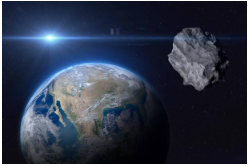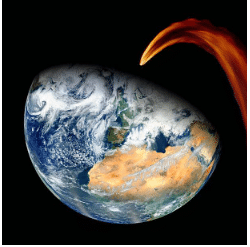Asteroid Day is a United Nations-sanctioned day of public awareness about the dangers of asteroid impacts, which is marked every year on June 30. Our objective is to educate the public year-round on the threats and opportunities posed by asteroids by hosting events, offering educational tools, and communicating with our worldwide audience on many digital channels.
Earth and a big asteroid in the space
World Asteroid Day
World Asteroid Day is an annual global celebration commemorating the Tunguska catastrophe of 1908, when an asteroid flattened a forest in Siberia covering 2,150 square kilometres (830 square miles). In its decision, the United Nations declared June 30 to be an International Day of Peace.
The goal of Asteroid Day is to raise awareness about asteroids and what can be done to safeguard the Earth, its people, and future generations from a catastrophic occurrence. For example, 2014 HQ124, discovered on April 23, 2014, flew past Earth at a distance of 1,250,000 kilometres on June 8, only 46 days after its discovery, and 2015 TB145 flew by at a distance of 490,000 kilometres only 21 days later. The day is part of a global initiative to defend our planet from asteroids. Several events are being held around the world to raise awareness about asteroids.
Asteroids
Asteroids are tiny stony bodies that orbit the sun in a circular orbit. They are mostly found between Mars and Jupiter’s orbits, but some have more eccentric orbits. Asteroids are rocky-metallic objects that range in size from roughly the size of pebbles to around 600 miles in diameter. They are too small to be considered planets, although they do orbit the Sun. They’re also known as the Solar System’s leftover stuff. Do you know that there are hundreds of thousands of asteroids in our solar system, with many more still to be discovered? Some asteroids are so tiny that detecting them is challenging.
Asteroid belt orbiting Planet Earth
History of World Asteroid Day
Stephen Hawking, director Grigorij Richters, B612 Foundation President Danica Remy, Apollo 9 astronaut Rusty Schweickart, and Queen guitarist and astrophysicist Brian May co-founded Asteroid Day. Over 200 astronauts, scientists, technologists, and artists signed the Asteroid Day Declaration, including Richard Dawkins, Bill Nye, Peter Gabriel, Jim Lovell, Michael Collins, Alexei Leonov, Bill Anders, Lord Martin Rees, Chris Hadfield, Rusty Schweickart, and Brian Cox. On December 3, 2014, Asteroid Day was formally established. Brian May began working with Grigorij Richters, the director of the film 51 Degrees North, about a fictional asteroid impact on London and the human condition that results from such an event, in February 2014. The film’s music was composed by May. After exhibiting the film at the 2014 Starmus Festival, Remy, Schweickart, Richters, and May co-founded Asteroid Day, which they announced during a press conference alongside Lord Martin Rees, Rusty Schweickart, Ed Lu, Thomas Jones, Ryan Watt, and Bill Nye. The event was aired live from London’s Science Museum, New York’s California Academy of Sciences, and So Paulo’s Science Museum. The International Astronomical Union named minor planet 248750 (discoverer M. Dawson) Asteroid Day in 2017.
Significance of World Asteroid Day
World Asteroid Day, also known as International Asteroid Day, raises awareness of the catastrophic consequences of an asteroid colliding with the Earth. The importance of asteroids in the construction of our cosmos, how they can be exploited in the future, how asteroids pave the path for future exploration, and how we can protect our world from asteroids’ impacts.
Meteor asteroid comet Earth impact collision
Asteroids are stony objects that orbit the Sun as well as the planets Mars and Jupiter. It is critical to comprehend the dangers of asteroid strikes. As a result, people all across the world are commemorating World Asteroid Day to raise awareness about asteroids and their consequences.
Interesting Facts About World Asteroid Day 2021
- Ceres was the first asteroid identified in 1801 by Giuseppe Piazzi.
- In 1802, astronomer William Herschel invented the term “asteroid,” which means “star-like.”
- According to current belief, asteroids are planetesimals (the building blocks of planets) that were never absorbed into one of our solar system’s eight planets.
- According to scientists, an asteroid strike 65 million years ago set off a chain reaction that wiped out the dinosaurs and influenced all life on Earth.
21/07/2022





